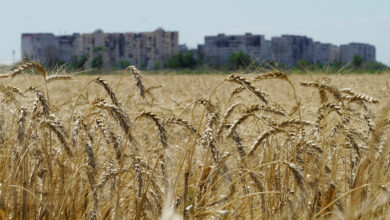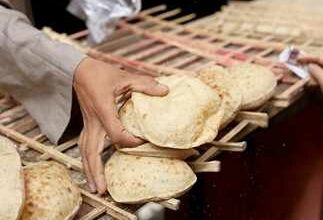
Egypt, the world's biggest wheat importer, can achieve self-sufficiency in wheat for its bread subsidy program by 2019 if silo storage capacity is raised by 1 million tonnes annually, the agriculture minister said.
Though self-sufficiency has been cited by successive governments as a goal, Agriculture Minister Ayman Abou Hadid for the first time provided explicit details.
"What I mean by self-sufficiency is self-sufficiency in the wheat used to make the subsidised loaves of bread. This is 9 million tonnes," Abou Hadid told Reuters in an interview on Monday.
"We can achieve it six years from now on condition that every year we can build silos adding 1 million tonnes capacity at least."
The government of former Islamist President Mohamed Morsy had targeted wheat self-sufficiency by 2016 without explicitly stating whether this meant self-sufficiency for the subsidy program or the country's entire needs.
Since the army ousted Morsy in July in response to mass protests against his rule, Gulf Arab allies have pledged billions of dollars to help shore up Egypt's fragile finances.
Egypt's current silo storage capacity is 1.5 million tonnes but the United Arab Emirates pledged part of its $4.9 billion aid package to Egypt to build 25 new wheat silos, each with a capacity of 60,000 tonnes. This would bring the country's storage capacity to 3 million tonnes by mid-2014.
"We are aiming and working hard for construction to end within six months," Abou Hadid said.
Egypt buys around 10 million tonnes of wheat a year from abroad through the state and private buyers. The state produces subsidised saucer-sized flat loaves of bread sold for less than 1 U.S. cent to millions of Egyptians. The program costs 21 billion Egyptian pounds ($3 billion) a year.
Abou Hadid said he expected current annual state wheat imports of 5-5.5 million tonnes to remain the same for several years due to 2-percent annual population growth in the nation of 85 million people and urban sprawl eating into farmland.
"In 1980 we were around 41 million people. Today we are about double that number," Abou Hadid said. "Most of the population growth is among the poorer socioeconomic segments."
"If this average growth rate continues as is, we will maintain the same import levels." Asked whether he expected current import levels to remain as they were until 2019, he said "yes."
CUSHION AGAINST SHRINKING GLOBAL SUPPLIES
Egypt reduced imports in the past year as Morsy's government bet on a bigger domestic crop. However, industry experts said the policy left the country at least 900,000 tonnes short of the wheat needed for its subsidy program.
Abou Hadid said Morsy's plan was based on one devised in 2009 by local agricultural research centres but that his administration revived it without devising ways to achieve it.
Egypt is targeting state wheat imports of 5 million to 5.5 million tonnes in the year to June 30, 2014.
Since the start of the 2013-2014 fiscal year on July 1, the main state wheat buyer, the General Authority for Supply Commodities (GASC), has bought over 2 million tonnes of wheat mainly from Romania, Ukraine and Russia. It also purchased from France in its last international tender.
Straight-talking Abou Hadid, appointed in July, said the self-sufficiency plan was aimed at cushioning Egypt's food security against shrinkage in global wheat supplies and fluctuations in international grain prices.
"India and China are entering the global (wheat) market … If this continues, the 25 million tonnes available in the global market will no longer be available," he said.
"This will either raise prices beyond our ability to buy or else we will not find quantities to buy. India and China are closer in proximity to the Black Sea Region. It's easier and closer for countries like Russia to supply them."
Abou Hadid said wheat in Egypt is grown across 3 million feddans of land annually, producing around 2.7 tonnes per feddan – a total of 8.1 million tonnes.
GASC procures around 3.6 million tonnes of wheat annually from farmers.
The state cannot procure the entire amount in one harvest season partly because of shortage in storage capacity. Farmers also keep some of the crop for their own consumption, to use as livestock feed or sometimes stockpiling for cash later.
Egypt is targeting an increase in productivity per feddan to 3-3.2 tonnes through improved wheat strains, Abou Hadid said.
"Then we can reach in this case 9.6 million tonnes," he said.
Abou Hadid said he expected local production to remain at around 8.1-8.3 million tonnes in the 2014 and 2015 harvest seasons. He said the state can get around 3.6-3.7 tonnes from farmers in 2014 and can get 5 million tonnes in 2015.
"What we will buy will depend on our storage capacity. We will not give false numbers just to tell people we will do things that will not happen," he said.
Abou Hadid said illegal construction of buildings on precious fertile soil in the desert nation was a major obstacle facing the wheat sector. Some 45,000 feddans of land have been encroached upon by villagers since the uprising that ousted former president Hosni Mubarak in February 2011, he said.
"Around 1.6 million tonnes of wheat is lost annually. Four billion Egyptian pounds ($580.75 million) are lost annually due to the lack of appropriate storage facilities."
Abou Hadid added that at least 20 percent of the total grain produced locally was wasted due to storage problems. ($1 = 6.8876 Egyptian pounds)




